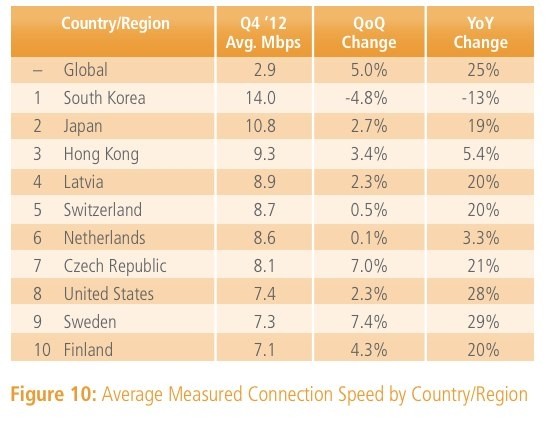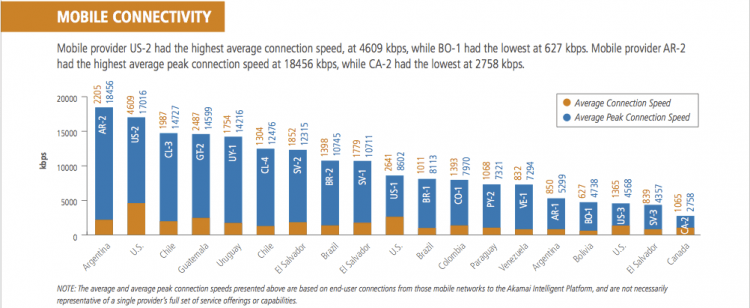Akamai has published its “State of the Internet” report for the last quarter of 2012 today, offering an overview of broadband speeds per country as well as figures on denial of service attacks, among other interesting metrics. According to the report, average global connection speeds rose 5 percent to 2.9 Mbps during the quarter, with South Korea, Japan and Hong Kong still leading the charts at 14, 10.8 and 9.3Mbps respectively.
The United States was ranked in eighth place with an average speed of 7.4 Mbps. Although still trailing Asian countries by a fair bit, that’s actually a 2.3 percent jump sequentially and 28 percent year-over-year, good enough to break into the top ten by moving up from 12th place last quarter to 8th.

As far as average peak connection speeds are concerned, which more closely represent the peak speed that an internet connection is capable of reaching, Hong Kong held on to the top spot at 57.5 mbps with South Korea trailing them at 49.2Mbps. The US jumped from an average peak of 28.7Mbps to 32.7Mbps in Q4 2012.
The report also looks at mobile connections, where Akamai noted an average connection speed of 4.5Mbps and average peak of 16.6Mbps in the U.S. Most of the company’s smartphone web data in the U.S. came from Android Webkit users (35.3 percent), followed by Apple Mobile Safari (32.6 percent), though when taking Wi-Fi connections into account Apple led with 58.7 percent of requests versus to 21.7 percent for Android Webkit.
Overall, mobile data traffic around the world grew 28 percent in Q4 and doubled year-over-year.
Lastly, Akamai also took a closer look at DDoS attacks with the help of 19 different cybersecurity and law enforcement agencies around the world. Unsurprisingly, China is the source of 41 percent of all of the cyber attacks in the world in the fourth quarter of 2012 -- that's more than the rest of the top ten combined -- with the US coming in second at 10 percent and Turkey in third place with 4.7 percent.

Attack traffic concentration increased very slightly from the third quarter of 2012, but looking at the whole year customers reported 768 DDoS attacks, a full 200 percent year-over-year increase.
As one of the world’s largest Internet content delivery networks, responsible for serving between 15 and 20 percent of all web traffic, Akamai is able to gather massive amounts of information on many metrics. You can check out their State of the Internet report for insights on other areas like broadband adoption, network connectivity/ availability/ latency problems, iPv6 growth/ transition, and other traffic patterns across the web.
